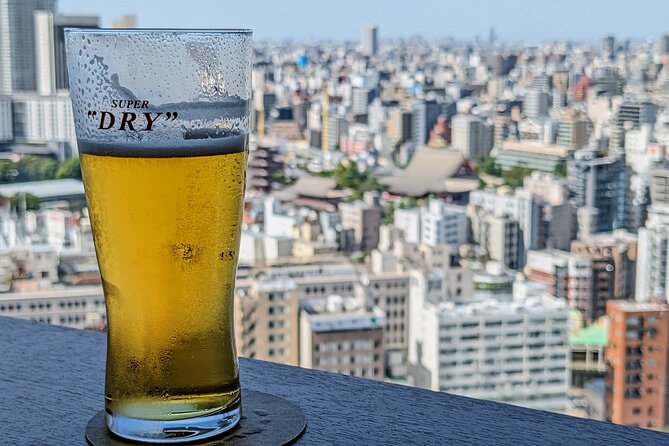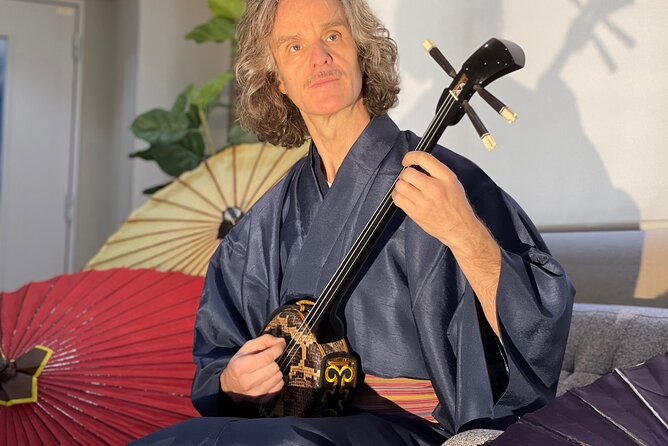In the bustling neighborhood of Shinagawa, a Japanese cooking class tailored specifically for vegans awaits those who desire a culinary adventure. Hosted by Miwas Japanese cooking class, this private tour/activity allows participants to explore the art of Japanese cuisine while adhering to a vegan lifestyle.
With an emphasis on using vegetarian or vegan ingredients, this hands-on experience offers a unique opportunity for individuals with dietary preferences to learn the secrets of Japanese cooking. Engage in meaningful conversations with the instructor as you prepare delicious vegan dishes, and conclude the class with a shared meal, savoring the fruits of your labor.
This personalized learning experience ensures that only your group will participate, creating an intimate atmosphere to explore the culinary traditions of Japan. With a flexible cancellation policy, this cooking class provides the freedom to embark on a culinary journey without any worries.
Quick Takeaways
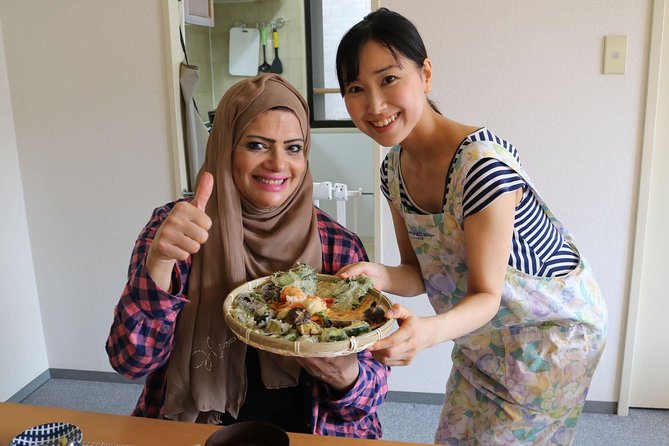
- The Japanese Cooking Class for Vegans is located in the bustling neighborhood of Shinagawa and offers a private tour/activity with a personalized learning experience.
- The class emphasizes the use of vegetarian or vegan ingredients, such as tofu, seaweed, miso, and tamari or soy sauce, and incorporates vegan cooking techniques.
- The class is tailored to accommodate specific dietary preferences, including gluten-free, soy-free, and nut-free diets, and provides vegan recipe ideas and cooking tips.
- Participants have the opportunity to interact with the host, learn about their background and culinary expertise, and foster a sense of community and camaraderie among participants.
Private Japanese Cooking Class in Shinagawa
When attending the Japanese Cooking Class for Vegans, participants have the opportunity to experience a private cooking class in Shinagawa. This class offers customized menu options to cater to individual dietary preferences, making it suitable for both vegetarians and vegans. The host of the class is able to tailor the recipes and ingredients to meet the specific needs of each participant, ensuring a personalized and enjoyable cooking experience.
Along With learning how to prepare delicious vegan dishes, participants also have the chance to engage in a culture experience. They can interact with the host, ask questions, and gain insights into Japanese culinary traditions.
The class concludes with the participants enjoying the meal they’ve prepared together, further enhancing the sense of satisfaction and accomplishment.
Vegetarian/Vegan Ingredients Used
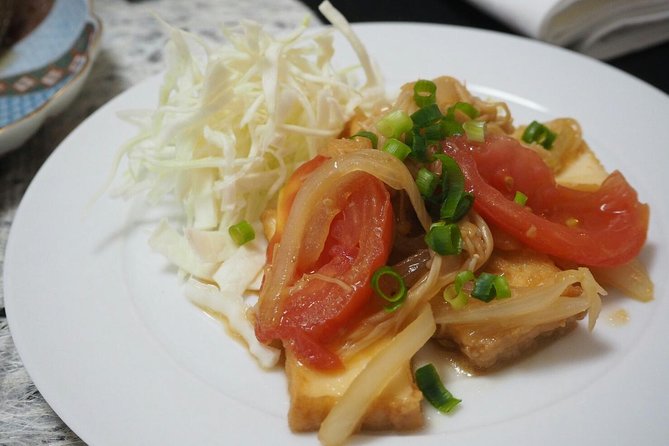
Participants in the Japanese Cooking Class for Vegans can expect to find a wide range of vegetarian and vegan ingredients used in the recipes. The class focuses on incorporating vegan cooking techniques and offers substitutes for traditional Japanese ingredients.
Here are some examples of the vegetarian and vegan ingredients that may be used:
- Tofu: A versatile ingredient commonly used as a substitute for meat in many Japanese dishes.
- Seaweed: Rich in nutrients and used in various forms such as nori, wakame, or kombu.
- Miso: A fermented soybean paste that adds depth and flavor to soups, marinades, and dressings.
- Tamari or soy sauce: These gluten-free alternatives are used to add umami and saltiness to dishes.
Tailored Class to Dietary Preferences
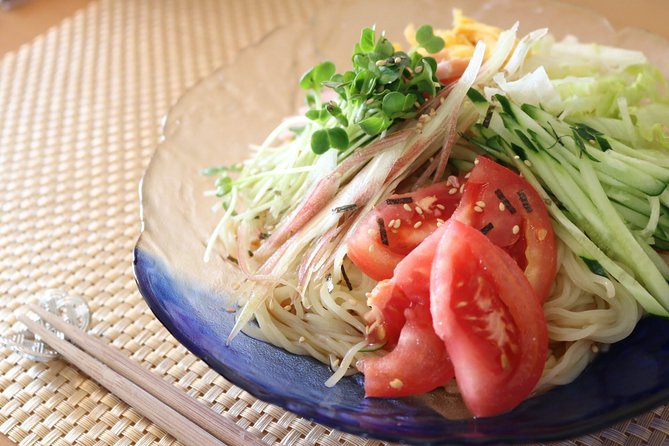
The Japanese Cooking Class for Vegans offers a tailored experience to accommodate specific dietary preferences. Whether you follow a gluten-free, soy-free, or nut-free diet, the host can customize the recipes and ingredients to suit your needs. This ensures that you can fully enjoy the cooking class without any worries or restrictions. In addition, the host is happy to provide vegan recipe ideas and cooking tips to help you incorporate more plant-based meals into your daily life. The table below highlights some of the dietary preferences that can be accommodated in the class:
| Dietary Preference | Examples of Accommodations |
|---|---|
| Gluten-free | Using gluten-free soy sauce, rice flour instead of wheat flour |
| Soy-free | Substituting soy sauce with tamari or coconut aminos |
| Nut-free | Avoiding the use of nuts as garnish or ingredients |
With the flexibility and adaptability of the Japanese Cooking Class for Vegans, you can confidently explore the world of vegan cuisine and gain valuable skills and knowledge to create delicious plant-based dishes.
Opportunity to Talk With the Host
During the Japanese Cooking Class for Vegans, participants have the opportunity to engage in conversation with the host. This interaction allows them to learn more about the host’s background, culinary expertise, and personal experiences with vegan cooking. The benefits of personalized cooking classes include the ability to ask specific questions, receive individualized guidance, and gain a deeper understanding of Japanese vegan cuisine.
To find vegan cooking classes, you can consider the following tips:
- Research local cooking schools or culinary institutes that offer vegan options.
- Check online platforms or websites that specialize in vegan cooking classes.
- Reach out to vegan communities or organizations for recommendations.
- Utilize social media platforms to connect with vegan chefs or cooking enthusiasts who may offer classes.
Enjoy the Meal You’ve Prepared Together
After engaging in conversation with the host during the Japanese Cooking Class for Vegans, participants can now savor the meal they’ve prepared together. This hands-on cooking experience not only allows individuals to learn about Japanese cuisine but also provides them with the opportunity to enjoy the fruits of their labor.
There are several benefits to participating in such cooking classes. Firstly, participants get to learn new cooking techniques and recipes that they can replicate at home. Secondly, they can explore and experiment with different flavors and ingredients, expanding their culinary horizons. Lastly, cooking classes foster a sense of community and camaraderie among participants, as they work together towards a common goal.
To find vegan cooking classes in different cities, you can use online resources, such as websites, social media groups, and food blogs, to search for local options. Plus, reaching out to local vegan and vegetarian restaurants or organizations can provide valuable recommendations.
Start Time and End Point
A private Japanese cooking class for vegans has a designated start time and end point. This ensures that participants can plan their day accordingly and know when the activity will conclude.
The start time for the cooking class is 10:30 AM, allowing attendees to begin their culinary adventure in the morning.
As for the end point, the activity ends back at the meeting point. This ensures that participants can easily return to their starting location after completing the class.
Cancellation Policy
The cancellation policy for the Japanese cooking class for vegans is straightforward and allows for a full refund if canceled up to 24 hours in advance. This policy provides freedom and flexibility for participants who may need to make changes to their plans. It’s important to note that if the cancellation is made less than 24 hours before the start time, no refund will be given. Plus, any changes made to the booking less than 24 hours before the start time won’t be accepted. The cut-off times for cancellations and changes are based on the local time. Participants should keep this in mind when planning their attendance. The cancellation policy ensures transparency and fairness for all participants.
The pricing information for the Japanese cooking class for vegans starts from $711.94. This fee includes the private cooking class in Shinagawa, the use of vegetarian or vegan ingredients, and the opportunity to tailor the class to dietary preferences. It’s important to read the terms and conditions provided by Viator, the operator of the cooking class, to understand any additional details or requirements. Participants can contact the Viator Help Center for any questions or concerns regarding the class.
Reviews and Ratings
Participants in the Japanese Cooking Class for Vegans can find valuable information and insights from the reviews and ratings provided by previous attendees. These reviews give travelers the opportunity to learn about the experiences of others who’ve taken part in the cooking class. They can gain knowledge about the authenticity of the class and the quality of the food prepared.
The reviews also provide an overall rating based on the opinions of the participants, giving potential attendees an idea of the general satisfaction level. It’s important to note that the reviews are checked for authenticity, ensuring that they’re genuine and not manipulated.
Common questions
Are There Any Restrictions on the Number of Participants in the Cooking Class?
There are no class size restrictions for the cooking class. Participants have the freedom to join the class without any limitations on the number of people.
Is There a Minimum Age Requirement for Participating in the Class?
The minimum age requirement for participating in the class is not specified. However, the host can tailor the class to accommodate dietary restrictions, including vegetarian or vegan preferences.
Can I Bring My Own Ingredients if I Have Specific Dietary Restrictions or Preferences?
Yes, participants can bring their own ingredients if they have specific dietary restrictions or preferences. The host of the Japanese cooking class can tailor the class to accommodate different dietary needs.
Are There Any Additional Costs or Fees That I Should Be Aware Of?
There are no additional expenses or hidden fees for the Japanese Cooking Class. The price starts at $711.94 and includes the cooking class, ingredients, and the opportunity to enjoy the meal prepared together.
Is There a Dress Code for the Cooking Class?
There is no specific dress code mentioned for the cooking class. Participants should wear comfortable clothing and closed-toe shoes for safety. It is also recommended to bring an apron to protect clothing from any potential spills or stains.
The Sum Up
To sum it up, the Japanese cooking classes for vegans in Shinagawa offer a unique opportunity for individuals with dietary preferences to learn the art of Japanese cuisine using vegetarian or vegan ingredients. Participants can engage in meaningful conversations with their instructor and enjoy a shared meal at the end of the class.
Operated by Miwas Japanese cooking class, these private classes provide an intimate and personalized learning experience. With a flexible cancellation policy, these classes are a wonderful way to explore the culinary traditions of Japan while adhering to a vegan lifestyle.

